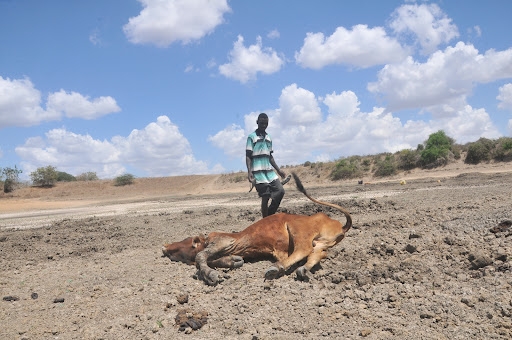President William Ruto has urged livestock keepers not to brand animals hide but instead, brand them on the ears.
This will curb damage to the hide which is crucial in leather production.
A cattle brand is a design that is seared into the hide of an animal, such as cattle or other livestock, usually around the hip for identification.
Ruto said the government has set aside Sh1.75 billion in the 2023/2024 budget to develop a leather industrial park industry in Kenanie.
“There will be more investment by the government and the private sector to further transform the leather value chain into a globally competitive finished leather and leather goods manufacturing industry. This will help reduce importation of leather goods, especially footwear,” he said.
While opening the show, Ruto also took part in the livestock auction where he bought two bulls at Sh300,000 and Sh400,000 which he donated to State House Girls and Nairobi School.
The winning champion bull was sold at Sh800,000 by Al Faraz Meat Experts.
Ruto said this year’s edition of the Agricultural Society of Kenya’s Nairobi International Trade Fair is special because it demonstrates the power of agriculture as the engine of Kenya’s economy and its potential to propel even greater rates of growth and development.
“Utilising our full agricultural potential can mitigate our dependence on food imports, protecting our foreign exchange and insulating us from vulnerability to international price shocks. At the same time, we remain most globally competitive in agriculture, both in traditional crops like tea, coffee, cut flowers and vegetables, as well as emerging export crops such as macadamia and avocado,” he said.
“This means that transforming agricultural productivity will turn around our balance of trade through increased exports,” Ruto added.
He said the government is aimed at transforming two million farmers from food deficit to surplus producers.
In addition to reducing dependence on basic food imports like domestic oil crops, wheat and rice by 30 per cent through the provision of financing for inputs, accompanied by intensive agricultural extension support.
“To turn agricultural production around to an accelerated growth trajectory, we have also made adequate provision to raise productivity in key food and other value chains. This includes edible oils, rice, cotton, dairy, beef and leather, to boost the tea sector and revamp underperforming and collapsed export crop value chains, including coffee, cashew, pyrethrum, avocado and macadamia,” said Ruto.
In line with this, the government is planning to invest in the cultivation of palm oil, sunflower, canola and soya beans.
This will go a long way in increasing the annual domestic production of edible oils from 80,000 MT currently to 240,000 MT over the next five years. This will reduce dependency on imports and save the economy Sh100 billion annually.
Similarly, the government will expand rice production schemes in Ahero and Mwea, as well as establish new ones in Tana River Kuya in Migori to make the country self-sufficient and save Sh34 billion in imports.
As a short-term measure to mitigate the high cost of food, Ruto said the government has waived duty on imported maize, rice, sugar and raw materials for manufacturing livestock feeds.
The National Food Reserve is also being enhanced and diversified to cushion the country against food shortages and ensure the availability of food during emergencies.
“In all our interventions in supporting production, we have embraced the bottom-up transformation of the foundational sector, agriculture, in order to ignite the engine of national development. In doing so, we have intervened to bring all the variables within our reach, affecting the cost of living under control, through strategic investment in critical value chains,” he said.















